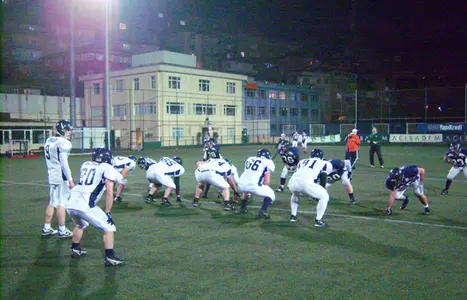
The Istanbul Cavaliers, shown above, have been an organized football program for 14 years.
Montana State Football Trio Travels to Turkey to Coach Over Spring Break
4/26/2010 12:24:17 PM | Football
Montana State football players Joe Schreibeis, Tanner Ripley and Caleb Schreibeis do not consider themselves ambassadors, but over spring break, that's exactly what they became—MSU football ambassadors to Turkey.
The trio traveled to Turkey in March to spend eight days in Istanbul, Turkey as part of a coaching staff working with a local football team, the Istanbul Cavaliers. They were part of a group that included six former and current players from the University of Texas and Tunch Ilkin, a former Pittsburgh Steelers NFL pro-bowler who hails from Turkey. Ilkin played his college football at Indiana State University and currently works as a football analyst for the Pittsburgh Fox affiliate. He is the only native of Turkey to ever play in the NFL.
“This guy is an NFL legend,” Joe Schreibeis said. “It was really a special experience to be there with him.”
The group worked with university students and local coaches for a six-day camp.


Joe Schreibeis first visited Turkey last summer on a trip with some university students and made friends with one of the local coaches of the university team. The coach, an American originally from Texas, contacted Schreibeis about coming back in the spring to help staff a camp.
“Football season stretches out pretty long over there,” Schreibeis said. “I got to know the coach while I was there and ended up going to practices quite a bit and hanging out with them then. I actually did a little coaching then and traveled with them to a game.”
Turkish football has a long season—up to eleven months a year. Teams aren't able to coordinate a schedule where they can play every week so there can be a break of two or more weeks between games. University teams are mixed in a league with club teams so the equipment discrepancy can be great from team to team.
“Some of the teams have backing of a university and some don't,” Ripley said. “The team that we worked with had pretty good equipment considering, but the league is trying to work on a way to maybe get some used equipment from American teams. Football over there is really in its infancy so they are still organizing at many levels,” he said.
Practice schedules can sometimes be stretched out as well. Teams may practice once or twice a week, depending on how organized they are. Some will practice three times a week at certain times of the year.
Ripley talked about the dedication of the Turkish players.
“We practiced everyday when we were over there, but that's a real rarity,” Ripley said. “I think some of the guys were really tired after the camp.
“Some of them work all day,” Ripley said. “And over there, the younger guys have the really tough hard labor jobs with lots of hours. They were already tired when they got there. I'm just amazed at the passion they had for the game and how dedicated they were.”
Even though tackle football is not very popular with the Turkish masses, the players and few fans are dedicated. The Istanbul Cavaliers have been a team for 14 years and one of the captains of the team has played on the team all 14 years.
“The guys on the team range in age from 16 to 30,” Ripley said. “It's interesting to see those ages together—you'd never see that over here.”


The schedule for the three included rising early in the morning for coaching staff meetings to plan the day and then spending time on the university campus building relationships. Then, the coaches and players would make their way across town for evening practice.
“We didn't start camp until 9:00 at night,” Caleb Schrebeis said. “So it was some pretty late nights. It took us about 45 minutes to get there from where we were staying, so we didn't get much sleep.”
Comparatively speaking, the three agreed the level of play is akin to a high school junior varsity level here. The shortage of coaches and lack of support for football nationally is a hurdle to high skill at this point.
“Quarterbacks are really hard to come by over there,” Joe Schreibeis said. “They don't grow up playing any games that include overhand throwing—all their games revolve around footwork or underhand tossing. So, the catching and throwing part of basic skills needs a lot of developing. Their tackling methods are kind of unorthodox as well, but they are learning. There's no football program for young kids, so by the time they get to the university age, they have some technique problems.”
The coaching staff also took some time to do an elementary workshop for some of the players on weight lifting and training, something which is not part of the regular football curriculum.
Games can be long affairs, according to the three. Referees are also learning in Turkey and games can include a high number of penalty flags followed by long conferences about the penalties.
Do they want to go back? Definitely. Joe Schreibeis is graduating in May with a degree in civil engineering. When asked if he had a job lined up yet, he mentioned he wasn't sure what he wanted to do.
“I may explore going back to Turkey,” Schreibeis said. “They aren't a lot of opportunities here right now in engineering and I'm thinking about going over there for a year or two to coach. I always said I'd never coach football, but going over there it's different. It's fun to see how excited they get about something as simple as learning to block a punt. There's a real satisfaction in helping them reach a level of excitement about learning the game.”
Leon Costello Press Conference: Kennedy-Stark Athletic Center
Thursday, July 31
A Conversation with President Dr. Waded Cruzado | Montana State Athletics
Monday, May 19
Big Cats, Little Trucks - Willie Patterson
Wednesday, May 03
Matt Houk Introductory Press Conference
Wednesday, May 03















